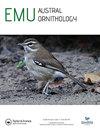Weather conditions affect spring migration departure of Ruddy-headed Goose in the southern Pampas, Argentina
IF 1.1
4区 生物学
Q3 ORNITHOLOGY
引用次数: 2
Abstract
ABSTRACT The Ruddy-headed Goose (Chloephaga rubidiceps) has two separate populations: one sedentary, which resides in the Falkland/Malvinas Islands and one migratory that overwinters mainly in the Pampas region (Argentina) and breeds in Southern Patagonia (Argentina and Chile). The migratory population has decreased considerably to less than 800 individuals and is categorised as Endangered in Argentina and Chile. Knowing the dates at which birds leave the wintering grounds might help to predict the arrival date at stopover sites and breeding areas. We aimed to examine the effect of meteorological conditions on the decision of Ruddy-headed Geese to start spring migration and their migration strategy. We used data from six adults, equipped with satellite transmitters, over 4 years (2015–2018), giving 12 individual departure dates. Weather conditions on departure dates were compared with that during the 15 preceding days. We tested the influence of weather conditions on the response variable measured as a comparison of pre-migration dates versus departure dates. Our results showed that Ruddy-headed Geese departure from their wintering grounds is in association with high wind speed, good visibility and low percentage of cloud cover. The relationship between meteorological conditions and the species decision to start spring migration is essential information for future management plans to prevent potential human-sheldgeese conflicts to escalate along their migration route. Recommendations for the conservation of this species that include implementing mitigation measures to reduce bird collision at human infrastructure, could be applied more specifically during the periods when birds are expected to arrive in each area.天气状况影响了阿根廷潘帕斯南部红头鹅的春季迁徙
红头鹅(Chloephaga rubidiceps)有两个不同的种群:一个是定居的种群,生活在福克兰/马尔维纳斯群岛;另一个是迁徙的种群,主要在潘帕斯地区(阿根廷)越冬,在南巴塔哥尼亚(阿根廷和智利)繁殖。迁徙种群数量已大幅减少,目前不足800只,在阿根廷和智利被列为濒危物种。了解鸟类离开越冬地的日期可能有助于预测它们到达中途停留地和繁殖地的日期。本研究旨在探讨气象条件对红头鹅春季迁徙决策及其迁徙策略的影响。我们使用了6名成年人的数据,配备了卫星发射器,历时4年(2015-2018年),给出了12个个人的离开日期。将出发日期的天气情况与出发前15天的天气情况进行比较。我们测试了天气条件对响应变量的影响,作为迁移前日期与出发日期的比较。结果表明,红头雁离越冬地与风速大、能见度好、云量低有关。气象条件与物种决定开始春季迁徙之间的关系是未来管理计划的重要信息,以防止潜在的人类冲突在迁徙路线上升级。关于保护这一物种的建议,包括实施缓解措施以减少鸟类在人类基础设施上的碰撞,可以在鸟类预计抵达每个地区的期间更具体地实施。
本文章由计算机程序翻译,如有差异,请以英文原文为准。
求助全文
约1分钟内获得全文
求助全文
来源期刊

Emu-Austral Ornithology
生物-鸟类学
CiteScore
2.00
自引率
7.70%
发文量
33
审稿时长
>12 weeks
期刊介绍:
Emu – Austral Ornithology is the premier journal for ornithological research and reviews related to the Southern Hemisphere and adjacent tropics. The journal has a long and proud tradition of publishing articles on many aspects of the biology of birds, particularly their conservation and management.
 求助内容:
求助内容: 应助结果提醒方式:
应助结果提醒方式:


